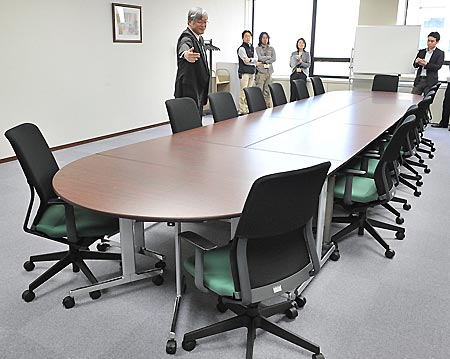Ever since the first Amazon Kindle came out, I was extremely excited by the opportunity to use electronic ink technology to read PDFs, online books, and even the news without having to choose between staring at a backlit computer screen or print out hundreds of pages. The major features all sounded very convenient, and I could even envision using the device as a glare-free translation display. It would almost be worth shelling out $360 if only it weren’t such a new and untested technology.
So now that the next edition is out, things are looking better, sayeth the New York Times:
The Kindle 2 has several incremental improvements over its predecessor, which went on sale in 2007. Amazon said the upgraded device has seven times the memory of the original version, turns pages faster and has a sharper display.
It also features a new design with round keys and a short, joysticklike controller — a departure from the earlier design, which some buyers had criticized as awkward. The device will ship Feb. 24. The price remains at $359.
CNET:
The Kindle 2 is much skinnier than its predecessor, slimming down to 0.36 inches in thickness from 0.7, but it’s only a tenth of an ounce lighter. The storage capacity has jumped from 256MB to 2GB, or about 200 to 1,500 books, and the electronic ink display has improved from a 4-shade to 16-shade grayscale.
The layout of some of the buttons has been restructured, and the new Kindle also has a text-to-speech reader.
But there are still some serious drawbacks that force me to wait until they make further improvements. The Kindle 1’s current blurb about how to read your personal files doesn’t look very attractive:
Personal Files
Eliminating the need to print, Kindle makes it easy to take your personal documents with you. Each Kindle has a unique and customizable e-mail address. You can set your unique email address on your Manage Your Kindle page. This allows you and your contacts to e-mail Word documents and pictures wirelessly to your Kindle for only $.10. Kindle supports wireless delivery of unprotected Microsoft Word, HTML, TXT, JPEG, GIF, PNG, BMP, PRC and MOBI files.
PDF conversion is experimental. The experimental category represents the features we are working on to enhance the Kindle experience even further. You can email your PDFs wirelessly to your Kindle. Due to PDF’s fixed layout format, some complex PDF files might not format correctly on your Kindle.
If you are not in a wireless area or would like to avoid the $.10 fee for wireless delivery, you can send attachments to “name”@free.kindle.com to be converted and e-mailed to your computer at the e-mail address associated with your Amazon.com account login. You can then transfer the document to your Kindle using your USB connection. For example, if your Kindle email address is Jay@Kindle.com, send your attachments to Jay@free.kindle.com.
And who wants to pay 99 cents a month to read blogs?
Blogs
Unlike reading blogs on your PC, Kindle blogs are downloaded onto Kindle so you can read them even when you’re not wirelessly connected. And unlike RSS readers which often only provide headlines, blogs on Kindle give you full text content and images, and are updated wirelessly throughout the day. Get blogs wirelessly delivered to your Kindle for as little as $.99 per month.
This system appears not to have changed with the new version. Basically, you need to convert any file into a proprietary Kindle format before it can be read on the device. But instead of offering an offline tool, they require you to send all files to the Amazon service first to either wirelessly transfer to the Kindle (for a 10 cent fee) or sent to a PC email address so you can use a USB connection to transfer files (converted into Kindle format) from your PC to the Kindle for free. I am guessing they intentionally make this a little cumbersome in order to direct customers to the fee-based services. This library blogger apparently had a relatively easy time of it. Still, as the over-demanding consumer, at this price it just doesn’t seem worth it. When the time comes, however, I am sure I will make full use of user-created guides like this one.
UPDATE: I should mention that this product has never been rolled out for an official Japan release (though the Kindle 2 may be changing this soon), and from what I have heard it does not work properly in the country. So my visions of owning a Kindle are contingent on me either living in the US or the product becoming usable within Japan.




